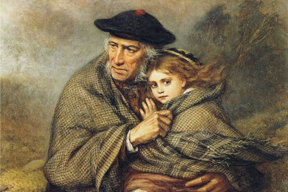|
George Eliot wrote in her novel, Silas Marner: "In old days there were angels who came and took men by the hand and led them away from the city of destruction. We see no white-winged angels now. But yet men are led away from threatening destruction: a hand is put into theirs, which leads them forth gently towards a calm and bright land, so that they look no more backward; and the hand may be a little child's." Perhaps, Eliot was correct back in mid-19th century England. However, I see no angels or children guiding men "away from threatening destruction." No one today needs a recitation of places throughout the world where men are being lead into cities of destruction: the Middle East, South Asia, Africa, South America, and even in America since 9/11 to see that my observation is correct. We, who are at the pinnacle of the animal kingdom, surely don't live in a peaceful planet. However, hope looms on the horizon amid our despair with wars and rumors of war. In which direction are we to look for hope and salvation? We should look toward Europe. Correct, hope abounds in the Old World. To be more precise, hope resides along the coast of Northwestern Spain and stretches nearly 4,000-miles along the coast to the Italian Riviera. Having determined where to look, what will hope look like? An angel or a child? No. Today, our deliverance from destruction might come to us in the form of ants. Correct. Argentine ants to be more precise. Those small little bugs might be able to accomplish what angels and children haven't-to help us live at peace with each other and to lead us out of the city of threatening destruction. We might find salvation if we heed these diminutive instructors. These agents of reconciliation have discovered something that we, who are at the top of the food and intellectual chain, haven't discovered.
First, some background information on ants: they are very territorial. Each colony of ants likes to dominate their turf. Ants from one colony don't permit other ants to transgress their colony's space. If they do, there is hell to pay. Ants will go to war-hand to hand combat. They will chew off the others ant's antenna, feet, head, or whatever. If that doesn't work, they will spit toxic fluid at their opponent. If you are an ant, you don't want to mess with another ant that feels you have violated its God given territory. However, in the 1920s, some Argentine ants snuck into Europe probably in potted plants. They liked Europe and multiplied. The result is a super colony of Argentine ants that stretch from Northern Spain to Italy. This super colony consists of billions and billions of unrelated Argentine ants that live in millions of nests stretched out for thousands of miles. For some reason, these ants are cooperating rather than spitting toxic chemicals or mutilating each other. These Argentine ants back in Argentina would have been in a state of war for the past century. They would have killed or been killed for transgressing the territorial rights of other colonies. However, something has changed in their ant nature. They have gone from pugnacious to loving, from aggressively chewing off the head of another to cooperating, from hate to love. This isn't the first time that this has happened with Argentine ants. A North American super colony stretches from Oregon to Mexico. However, this super colony has been eclipsed by the super duper colony in Europe. The European one is three times as long as the North American version. What is striking about these super colonies whether in Europe or North America is that these Argentine ants tend to get along with each other even though they aren't from the same original colony. Scientists think that they have somehow changed the genetic markers that allow them to differentiate the infinitesimal differences between one colony and the other. Therefore, they are all brothers and sisters, and they get along. What can we learn from those little insects? Well, if ants can overlook minute differences between ants, why can't we overlook differences between us. We are all originally from Africa. Therefore, the slight variations that exist between races are insignificant. The scientists that work on mapping the human genome discount the traditional grouping of humans into race-based groups as meaningless since we all Africans originally. Well, there it is. Ants will lead us to a better land devoid of destruction-provided we follow their lead. Banner: Those small little bugs might be able to accomplish what angels and children haven't-to help us live at peace with each other and to lead us out of the city of threatening destruction.
"The Hand May Be a Little Child's" Visit the "The Hand May Be a Little Child's" page to read more about this topic.
|








